
Loose lips sink ships...
Vol 1: February 2016
Workplace Gossip
Background
"It may sound like a harmless, unavoidable by-product of corporate life, but don't be fooled: Left unchecked, gossip can wreak havoc on company morale and efficiency." — BusinessWeek
What is workplace gossip?
- A form of informal communication among colleagues focused on the private, personal and sensitive affairs of others; damaging to their reputation; negative.
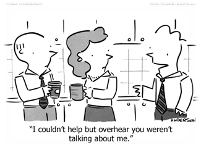
What are other concerns of workplace gossip?
- As a listener, you are a co-narrator to gossip. In other words, the act of active listening actually supports and promotes gossiping. The more you listen, the more you encourage it.
- On the flipside, leaders have to create the kind of environment where it is safe for people to voice concerns and ask for clarity and action without gossiping.
What are the adverse effects of workplace gossip?
- It can damage relationships and the reputations of other persons in the workplace.
- It can increase conflict and decrease morale.
- It results in strained relationships, breeds resentment
- It is a roadblock to effective communication and collaboration
- It breaks down the trust level within the group [...]
- It is the death of teamwork as the group breaks up into cliques
- Productivity is lost, as are good employees who do not want to work in such a toxic environment.
How do you change the culture of workplace gossip?
- Turn it around by saying something positive.
- Be responsible and responsive: remind others when they are gossiping. It’s our duty.
- Be direct. If you confront the gossiper and confidently tell him or her that such behavior or conversation is uncomfortable, it's likely to stop.
- Don't be afraid to go to a superior. Gossiping wastes a lot of company time and hurts morale. A company interested in a healthy work environment will value the opportunity to correct this type of situation.
- Create a forum for formal communication: gossip often arises in circumstances where there is a paucity of formal communication, for example during periods of organizational change or in highly hierarchical cultures where information either moves slowly or does not move at all.

Citations:
Weissenberger, Beth. "Gossip in the Workplace." BusinessWeek. Bloomberg. 3 Nov 2009. Web. 10 Feb 2016.
Georganta K, Panagopoulou E, Montgomery A. "Talking behind their backs: Negative gossip and burnout in Hospitals." Burnout Research. 2014 Sept; 1(2): 76-81.
Abbajay, Mary. "The Danger of Workplace Gossip." Careerstone Group. Web. 10 Feb 2016.
Banner. Woman gossip, polka dots retro background. Digital Image. Shutterstock. Lavitrei. Web. 9 Feb 2016.
Figure 1. Gossip Cartoon #6907. Digital Image. Andertoons. Mark Anderson. Web. 9 Feb 2016.
Figure 2. Dalai Lama. Digital Image. Barackface. Paramendra Bhagat. 7 Jan 2016. Web. 4 Feb 2016.
Close
Narrative #1 (Attending to Attending)
In the bunker ...
Attending #1: “Have you worked with Resident A? I work with him tomorrow”
Attending #2: “Gosh, he is horrible!! You need to watch out for everything”
Type of Interaction ⇒ Poor Interaction
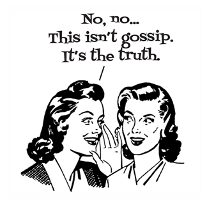
Bye Felicia
- What was done well? – “Professional behavior”
- Nothing at all
- What went wrong? – “Behavior inconsistent with a culture of safety”
- It can damage relationships and the reputations of other persons in the workplace.
- Overall, spreading such information can increase conflict and decrease morale.
- It results in strained relationships, breeds resentment even from people who have never worked with the other resident.
- It breaks down the trust level with that resident.
- What could have been done better? “Specific strategies to implement a culture of change”
- Say something positive, highlight the strength in others while giving constructive feedback (especially where patient safety is involved) to a fellow Attending about their weaknesses (with the appropriate language). For instance – “Resident A still needs some help in these areas ---- but overall, he is –- (highlight strengths)”. Let others (Attending #2) form their own impression of others.
- It is possible to voice our concerns and ask for feedback from a colleague without gossiping.
- Remind others when they are gossiping. It’s our duty.
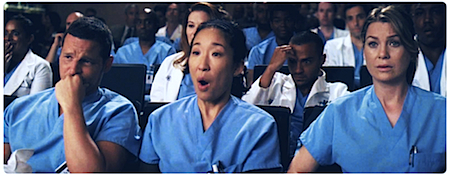
Citations:
Figure 1. Barrington, Michelle. Off to school we go. Digital Image. Gee You're Brave. Michelle Barrington. 26 Jan 2013. Web. 10 Feb 2016.
Figure 2. Christina Yang is not the big death in Grey's Anatomy finale. Digital Image. Sandra Oh News. 1 May 2012. Web. 10 Feb 2016.
Close
Narrative #2 (Attending to RCTA)
In the bunker at 8 PM ...
Attending #1: "Why is Dr. X now a direct provider for this cardiac case?"
First Call Resident: "Resident B was in there earlier, but Dr. X sent him home since he is back-up."
Attending #1: "Probably more because Dr. X was sick of working with him!"
Attending #2: "Please don't make comments like that about residents in front of other residents."
First Call Resident: "You know...Resident B is a hard worker and really tries his best."
Type of Interaction ⇒ Combination: Good (Attending #2, First Call Resident) and Poor (Attending #1) interaction
- What was done well? – “Professional behavior”
- First Call Resident highlighted the strength of Resident B instead
- Attending #2 reminded Attending #1 of inappropriate behavior in front of the First Call Resident
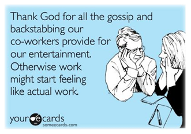
- What went wrong? – “Behavior inconsistent with a culture of safety”
- Gossiping can damage the reputations of other persons (Resident B) in the workplace.
- Overall, spreading such information can decrease workplace morale.
- It results in strained relationships, breeds resentment even from people (eg. Attending #1) who have never worked with the resident (Resident B). Additionally, the First Call resident could start resenting Attending #2.
- It breaks down the trust level with that resident as well as in the group as a whole.
- It is the death of teamwork as the group breaks up into cliques.
- Productivity is lost, some employees find it difficult working in such a toxic environment.
- What could have been done better? – “Specific strategies to implement a culture of change”
- Turn it around by saying something positive. Constructive criticism or feedback (with the appropriate language) can be given to that resident directly.
- Remind others when they are gossiping. It’s our duty.
- Be direct. If you confront the gossiper and confidently tell him or her that such behavior or conversation is uncomfortable, it's likely to stop.
- Don't be afraid to go to a superior if upset. Gossiping hurts morale. A company/hospital interested in a healthy work environment will value the opportunity to correct this type of situation.
- Create a forum for formal communication: gossip often arises in circumstances where there is a paucity of formal communication/feedback; for example, during periods of organizational change or in highly hierarchical cultures where information either moves slowly or does not move at all.

Citations:
Figure 1. Harmonie1049180. Workplace gossip. Digital Image. Someecards. Someecards, Inc, 16 May 2012. Web. 10 Feb 2016.
Figure 2. Lowe, Lindsay. Al Pacino. Digital Image. Parade. AMG/Parade, 24 Apr 2015. Web. 10 Feb 2016.
Close
Narrative #3 (RCTA to RCTA)
In the PACU Courtyard (with patients present)...

— Ron Burgundy
Resident #1: "Super crazy case in OR 32 this morning"
Resident #2: "What happened?"
Resident #1: "Dumb cardiology fellow dissected the aorta and they had to crash onto bypass."
Resident #2: "Yikes, how's the patient?"
Resident #1: "He's totally dead, they're taking him up on ECMO so his family can see him."
Recovery patient in corner to nurse: "Is that for real? Does that happen often???"
Type of Interaction ⇒ Poor Interaction
- What was done well? – “Professional behavior”
- Nothing at all

Figure 2. Shh! Keep it down out there!
- What went wrong? – “Behavior inconsistent with a culture of safety”
- The word choices are negative and damaging to the reputation of a colleague (surgeon).
- This interaction highlights the need to keep gossiping away from patient care areas (PACU etc.) It is very inappropriate to involve patients in your discussions.
- Active listening actually supports and promotes gossiping. The more you listen without intervening in a positive manner, the more you encourage it (Resident #2).
- What could have been done better? – “Specific strategies to implement a culture of change”
- Turn it around by saying something positive.
- Talk more about “the situation” than “the person” using appropriate language.
- Remind others (Resident #2) when they are gossiping or using inappropriate terminology. It’s our duty.
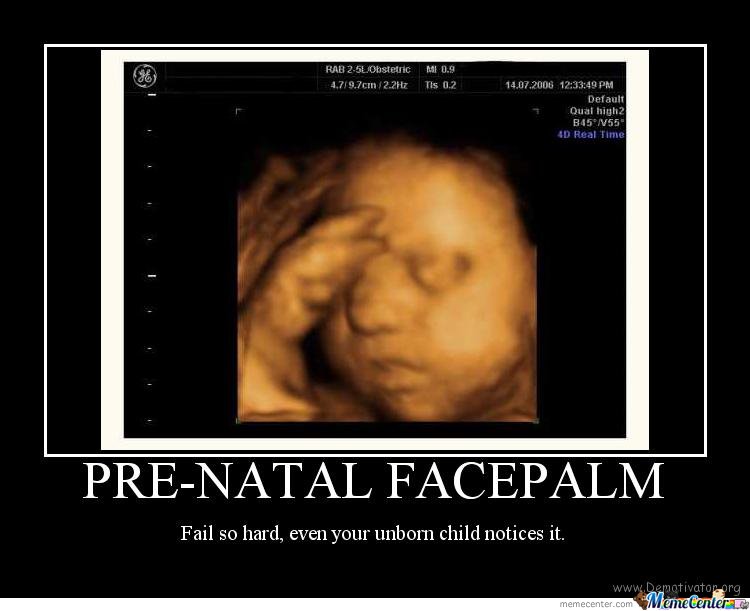
Citations:
Figure 1. Stay classy — Ron Burgundy. Digital Image. Meme Generator. Meme Generator. Web. 10 Feb 2016.
Figure 2. Higgins, Chris. Shh. Digital Image. GirlsHeartBooks. GirlsHeartBooks. 4 Jun 2012. Web. 10 Feb 2016.
Figure 3. W. Unborn facepalm. Digital Image. Meme Center. Meme Center. 2012. Web. 10 Feb 2016.
Close
© The Trustees of the University of Pennsylvania | Site best viewed in a supported browser. | Report Accessibility Issues and Get Help | Privacy Policy | Site Design: PMACS Web Team.
